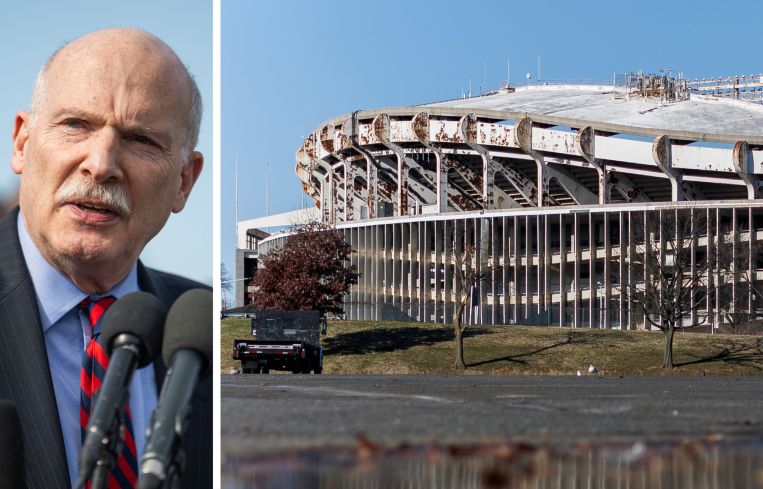D.C. Council, Washington Commanders Reach Revenue Deal on RFK Stadium Project
Changes to the deal with Mayor Bowser include directing $674M in stadium earnings to the city
By Nick Trombola July 24, 2025 4:15 pm
reprints
The Washington Commanders and D.C. Council have reached a new agreement regarding the District’s long-awaited RFK Stadium redevelopment, likely assuaging some concerns about the development’s costs and teeing up the council or a vote on the project early next month.
D.C. Mayor Muriel Bowser earlier this year unveiled a plan with the Commanders to bring the exiled team back to the District in a $3.6 billion project, of which the District would commit roughly $1 billion. The council’s new agreement with the team does not fundamentally alter financial commitments or development plans, according to a Bowser spokesperson, though it significantly boosts the amount of revenue that the city will receive from the new stadium and clarifies certain deal provisions, among other improvements.
The council’s biggest changes to the deal, announced by Council Chair Phil Mendelson on Thursday, are reflected in the stadium’s revenue streams. The city now expects to earn $674 million over the next 30 years via the development, from a combination of parking revenues from non-stadium event days, parking taxes, and sales taxes on merchandise, food and beverages. Those revenues would have otherwise gone to the Commanders or to stadium reinvestment fund, according to Mendelson.
The agreement also includes specifications on some of the deal’s vaguer components. For example, a community benefits agreement, which previously did not specify a funding amount, will now receive $50 million, along with a commitment from the football team “linking youth sports with education.” The team’s senior leadership and sales office will also now be located within the District, and the council’s legislation will include construction deadlines for each development phase, per Mendelson’s office.
The council will vote on the RFK stadium legislation on Aug. 1, Mendelson added.
“It’s clear that the Commanders showed through their negotiations their commitment to the District. And their willingness to consider what’s in the best interest of our citizens,” Mendelson said in a statement. “The process working with the Commanders has been extremely productive and they’ve been a cooperative partner. Overwhelmingly, residents have asked the council for due diligence on this multibillion-dollar deal. And under immense outside pressure to rush the process, I feel that, along with next weeks’ hearings, the council will have what’s needed to move forward with a vote.”
The council has simultaneously tinkered with how the District will pay for its stadium funding commitments, an especially sticky topic given the city’s $400 million budget deficit. The council restructured its debt financing by not capitalizing interest for fiscal years 2028 and 2029, which Mendelson claims will save the city roughly $55 million. The stadium legislation will also now redirect $600 million for the District’s sports facilities tax, which it imposes on businesses with more than $5 million in annual gross receipts, to a new Transportation Improvement Fund for Metro upgrades.
“Bringing the Commanders home is about more than a stadium,” Bowser wrote Thursday morning on X. “It’s about creating jobs, attracting revenue, and driving investment to Ward 7 — and it’s coming at time [sic] when we need it the most. Let’s get this done for D.C.”
Although Bowser is supportive of the agreement, she did not directly play a role in the negotiations between the council and the team, her spokesperson said. A representative for the Commanders did not immediately respond to a request for comment.
The council’s agreement comes amid intense pressure to get the deal across the finish line — not just from Bowser, who wanted the approval by July 15, but also from the likes of President Donald Trump and House Committee on Oversight and Government Reform Chairman James Comer.
Comer’s keenness regarding the deal is straightforward. Congress in December passed a bill granting D.C. administrative control over the stadium site, which is owned by the federal government, for 99 years. Trump’s motivation, meanwhile, was more of a surprise. The president threatened earlier this week to restrict the deal if the franchise did not revert its team name from Commanders back to the outdated racial slur it ditched five years ago. Yet Trump has not been personally involved in the deal between the team and the District, and it’s not clear what actions he would take to derail it.
Nick Trombola can be reached at ntrombola@commercialobserver.com.



